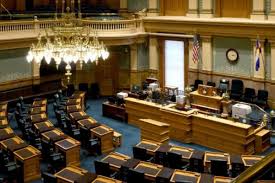On Monday, the Colorado House advanced a legislative package aimed at making near-term progress on air quality, ozone, and climate goals while focusing on an economy-wide transition that will support Colorado’s future for generations to come.

The floor of the House of Representatives at the Colorado State Capitol. Courtesy image
It’s telling that two House sponsors who represent central Colorado Rocky Mountain counties were strong and vocal supporters of SB24-230. Sponsored by Speaker McCluskie and Representative Elizabeth Velasco, the bill would generate significant new funding for transit and rail, as well as land and wildlife habitat conservation and restoration, with modest fees on oil and gas production in Colorado that will be tied to oil and gas production.
SB24-229, sponsored by Assistant Majority Leader Jennifer Bacon and Representative Jenny Willford, would establish more permitting and enforcement authority over oil and gas operations for the state to lower emissions, improve air quality and reduce pollution in Colorado communities.
This package, announced last week, is an agreement between Democratic Legislative Leadership, Governor Jared Polis, a broad coalition of major environmental nongovernmental organizations, and large operators in Colorado’s oil and gas industry.

Well flaring of oil and gas wells can happen at wells near residential areas. Image courtesy of Currentargus.
“Breathing shouldn’t be dangerous, yet the air quality in many Colorado neighborhoods triggers asthma attacks and nosebleeds,” said Assistant Majority Leader Bacon (D-Denver).
“We need to act now to clean up Colorado’s air quality that for more than a decade has disproportionately impacted low-income communities and people of color, he added. “After months of conversations with industry, environmental organizations, and state agencies – we’ve come up with a plan to improve our air quality and mitigate some of the harmful impacts of ozone on our communities.”
“Colorado’s poor air quality is leading to long-term health risks for our community – we need to take steps now to reduce air pollution and keep our neighbors safe,” said Jenny Willford (D-Northglenn). “This landmark package enables us to crack down on repeat violators, improve our air quality and establish important timelines for new pollution reduction measures. To achieve our climate goals, we need to reduce emissions and this bill brings us there.”
SB24-229, passed the House by a vote of 43 to 18. The bill will:
- Improve the oil and gas permitting process with more robust modeling and review of the latest control measures.
- Expand enforcement actions and develop new approaches to prevent repeat violations and preempt future emissions violations.
- Establish additional transparency around complaints and enforcement actions by the Air Pollution Control Division, including establishing an annual report about investigations and enforcement actions as well as an email notification system to alert interested parties of violations and settlements.
- Codify rulemaking to achieve reductions in ozone-causing NOx from oil and gas operations by 50 percent by 2030 through a proposed rule to the Air Quality Control Commission no later than August 31, 2026.
- Provide additional protections for Disproportionately Impacted Communities (DICs), including expanding the mission of the orphaned wells mitigation enterprise to also include marginal wells, focusing funding on plugging marginal wells in DICs and near population centers, and establishing new dedicated community liaisons at the Energy and Carbon Management Commission.
“With this legislative package, we’ve achieved an agreement that puts Colorado’s land, water, and air first,” said Speaker Julie McCluskie (D-Dillon). “I’d like to thank the governor, bill sponsors, and all the groups that worked together to reach an agreement that will increase transit options for everyone in the state, including our rural and mountain communities. Taking steps now to improve our air quality, restore our lands, and boost transportation options will preserve the Colorado way of life for generations to come.”
“Destructive wildfires, floods and other extreme climate events are disproportionately impacting communities like mine, which is why we need policy changes that protect our environment,” said Rep. Elizabeth Velasco (D-Glenwood Springs). “We’ve made important progress over the years to clean up our air and the harmful effects of oil and gas production has been consequential on my community. However, this legislative package is a monumental agreement that will increase transit options, advance conservation efforts, and reduce harmful pollution that threatens our Colorado way of life.”
SB24-230, passed the House by 40 to 18. The bill creates a new fee tied to oil and gas production with 80 percent of the revenues dedicated to transit and administered by the Clean Transit Enterprise, and 20 percent to natural lands and wildlife conservation. Of the 80 percent dedicated to transit, the majority will bolster local transit operations while 20 percent will support the expansion of passenger and commuter rail in Colorado. These funds will support RTD in providing new services including Northwest and North rail lines.
Oil and gas development is among the largest contributors in Colorado to both greenhouse gas emissions and ozone pollution. Reducing vehicle trips by supporting reliable transit and rail service statewide can offset these impacts by lowering ozone-forming and greenhouse gas emissions while improving quality of life and alleviating traffic.
To address the impacts on wildlife from oil and gas production, Colorado Parks and Wildlife will use the fee revenue to provide remediation services by conducting a range of badly needed conservation work, including restoring lands and improving ecosystem health, improving wildlife connectivity, and creating new state parks and wildlife areas, with a focus on benefitting native biodiversity.








Recent Comments